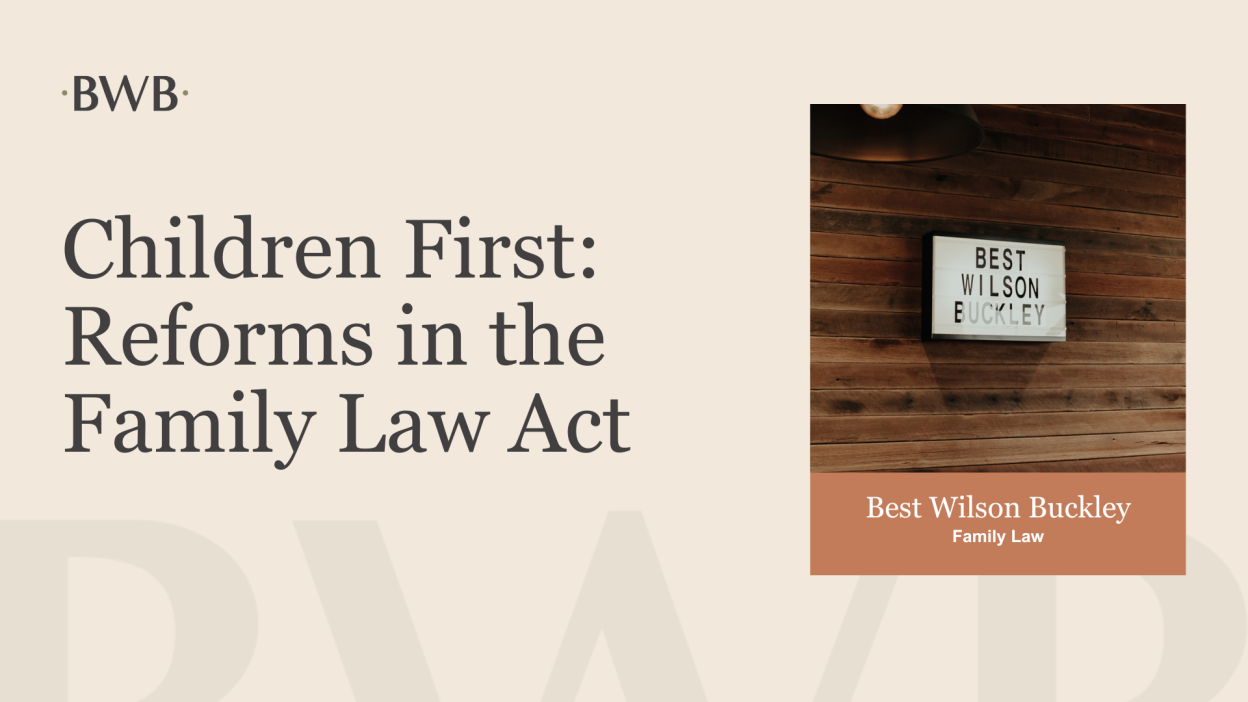Children First: Reforms in the Family Law Act
By Best Wilson Buckley Family Law |06 November 2023 |General | Parenting Arrangements and Disputes-Articles

Last week we released a summary of the major changes coming to the Family Law Act and now we have further details on how those changes might work in practice and put the best interests of children front and foremost in the family law system. Back in March 2023, the Attorney-General, the Hon Mark Dreyfuss, introduced legislation into Federal Parliament which sought to amend the Family Law Act to make sure the best interests of children were further prioritised and placed at the center of the family law system for parenting orders. In doing so it was also proposed to simplify the factors that the court has regard to in determining a child’s best interests.
To do so the legislation proposed to remove a series of longstanding sections of the Family Law Act that had been in place since 2006 and which were frequently referred to as the “presumption of equal shared parental responsibility” and reduce the list of discretionary “section 60CC factors”.
The legislation amending these provisions of the Family Law Act has now completed its passage through Federal Parliament and was passed by both houses on 19 October 2023. While the precise date that the new law will commence is yet to be confirmed, we anticipate it will likely take place some time in the first half of 2024.
For context, since 2006 the presumption meant that when parties separated and were proceeding through a parenting trial, the court was required to consider whether it was in the children’s best interests for their parents to share long-term decision-making and, if so, a presumption that the court would consider making orders for children to have equal time with each of their parents. The presumption could be rebutted in certain circumstances, including where children were at risk of harm from domestic and family violence. If the court did not make orders for equal time, the court was then required under the pathway set out in the Act to consider making orders for a child to live with one parent and spend significant and substantial time with the other.
The new changes will apply to all future parenting matters, as well as those which are already in court but are yet to have their final hearing. In practice it will also shape the negotiations and outcomes for those matters that do not proceed to court.
What this means for now is that in coming months, and possibly years, there is likely to be a degree of uncertainty around what the changes will ultimately mean in practice. Depending upon which media article you read, there is divided opinion as to whether the proposed changes strengthen the protections afforded to parents and children who have experienced domestic and family violence or whether the changes may well mean there is a return to a situation which sees some parents spending less time with their children now that the court’s requirement to consider equal time has been removed.
While it is difficult to predict what will play out as the court begins to interpret the new terms of the law, there are a number of key concepts worth considering.
Firstly, as was the subject of various the submissions made prior to the legislation being changed, it was suggested there was a great deal of confusion created by the current drafting of the Act by those persons who experienced separation but did not have the benefit of legal advice. There have been a number of occasions over the years where those precise misapprehensions played out with the results not always in the best interests of the children involved. This included, for example, arrangements which were negotiated and agreed to by well-meaning self-represented parties for very young infant children (sometimes six months or less of age) spending week about time with each of their parents. It was suggested a number of times in those circumstances that the only reason that the parents agreed to those arrangements directly was because they thought that was what the law required. To be clear, even though there was a presumption and pathway for the court to consider making equal time arrangements, there were always situations where that would never be appropriate, including one of separating exceptionally young infant children from a primary caregiver. The changes will help parties negotiate better outcomes even if they are unable to afford legal advice.
Secondly, where there is now perhaps a new degree of uncertainty as to how the court is likely to apply the new law, the need for experienced legal representation and advice at an early stage is even more crucial. It is incumbent on lawyers and other practitioners involved in the family law system to become aware of the changes promptly and assist clients to navigate that period of uncertainty with clear and practical advice. While the law has not yet to commenced, the team at Best Wilson Buckley Family Law are already considering the implications in practice, ready to anticipate the change.
While there perhaps has been a great deal made of the significance of the changes to the law removing the presumption of equal shared parental responsibility, there are reasons for optimism. Even with the presumption removed, what has not been changed is the better part of the last 20 years of decided cases where the court has been tasked with considering the parents before them and making orders, particularly in difficult and contested situations, which promote the best interests of children.
Prior to the 2006 introduction of the presumption, there was an increasing trend to ensure that children were always in the care of their primary parent in the form of their mother and then had contact with their father. In many respects, the court has moved on substantially since those amendments were passed some 18 years ago. While the court has changed its name in that time, the Federal Circuit and Family Court of Australia remains an entirely specialised court established to decide family law matters. Within the judiciary is an exceptionally broad and dedicated staff of judges, judicial registrars and other court professionals who remain well placed to consider the breadth of issues and circumstances which matters tend to produce before the court. Legal practitioners and parties who find themselves within the system can have some confidence that that knowledge has not only been retained but indeed will bring clear focus and attention to the new legislation.
It is reasonable to anticipate that the court will continue to look at the parents before them, less so based upon traditional roles, but more based upon the individual facts and circumstances of the families that come before them. The Court has, for the most part, become exceptionally good at distilling the difference between the imperfections and lapses in judgement of an otherwise well-meaning and loving parent from those that are far more entrenched and present genuine and unacceptable risks of harm to the children that would otherwise be in their care.
From the advocate’s perspective, if there are appropriate arrangements where parties are reasonably able to co-parent their children, are in close proximity to one another, and there is an ability for the children, given their ages and state of development, to move freely between parties’ households on a regular basis, then it seems entirely likely that the court will continue to entertain and have no hesitation in making orders for equal sharing of long-term decisions and equal time arrangements in those circumstances.
Similarly, and as has already been the case for many years, where there are significant issues of domestic and family violence, neglect, substance abuse, untreated mental health, coercion or control, the court has equally been prepared to step in, even at an early stage, to limit those risks by restricting the time that an offender or person who presents such risks might have with the child to exceptionally limited or supervised time.
Even with the presumption and mandatory equal time considerations removed, the court still has, under the new changes, discretion to make a range of appropriate orders for time with each parent.
If you have any questions or concerns in regards to family law parenting matters, or how the new changes to the Family Law Act may affect your situation, contact our Brisbane, Ipswich, North Lakes, Toowoomba or Dalby offices today.
Related Articles

Parenting Arrangements and Disputes
What is ‘Equal Shared Care’ in Family Law in QLD & What Does it Mean?
By Best Wilson Buckley Family Law

